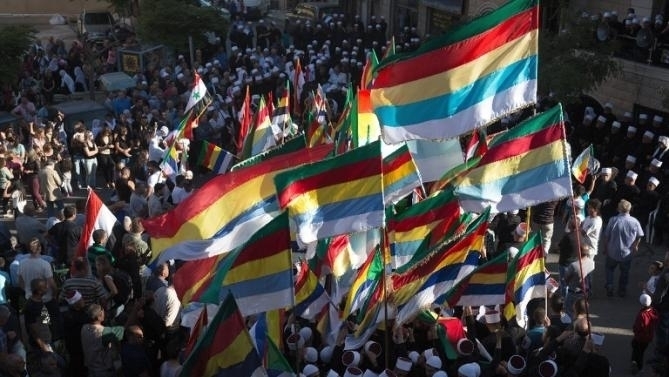Only days after the leader of Israel’s conservative Jewish Home Party, Naftali Bennett, declared a plan to expand the Jewish presence in the occupied Golan Heights to 100,000, the area was suddenly thrown into a state of conflict. Israeli settlers panicked and ran to shelter, with the northern area declared a closed military zone from Mount Hermon to Shabaa.
It soon became clear the panic was the result of oversensitive radar equipment. Israeli radars caught signs of missile fragments fired by the Syrian Army on Nusra Front positions on the eastern side of the Syrian border, with Israel declaring the area a closed military zone to prevent Druze from crossing the border to protect their brethren in Suweida and Alhadar.
The ensuing result was captivating, with the Israel Defense Force (IDF) fearing the incident could severely impact the tourist season as Israeli vacationers quickly escaped the Golan Heights. Officials in Jerusalem dreaded a loss of enthusiasm towards the expansion of settlements in the occupied Golan Heights and the collapse of Bennett’s project before it was able to see the light.
Israel is closely observing the situation inside Syria and is considered by some experts to be a secret player in the country’s ongoing civil war. Jerusalem is known to have ties with elements of the armed opposition forces, yet allows Syria’s air force to enter Israeli airspace in Golan, directly violating the Agreement of Disengagement between the two countries. The IDF routinely allows hundreds of injured Syrian opposition fighters to enter its territories, but claims that the town of Alhadar is a protected Druze area, warning members of the community against entering. Additionally, Israel has also conducted airstrikes on Syrian army positions, yet refuses to openly assist the Free Syrian Army (FSA) and internal opposition.
Whatever its involvement, Jerusalem has been successfully manipulating the civil war across its borders for more than four years while concealing its real agenda. But a number of questions remain unanswered: does Israel actively support the Assad regime – thus strengthening the rival Iranian axis, or does it support the opposition who may bring an extremist Islamic regime to its borders? Whatever the case, with the Druze now in the picture, its program is unstable again.
Israeli Druze discontent towards Jerusalem’s vindictive Syria policy has intensified since the repeated targeting of civilians in Qalb Lozeh and Suweida, with some accusing Israel of deliberately pitting the Nusra Front against Syria’s Druze and pro-regime forces. This resentment escalated into a popular uprising with protest organized in the occupied Golan Heights and surrounding Druze villages in the Galilee and Carmel. Meetings were conducted with political and military officials, including Israeli President Reuven Rivlin and a number of junior officers in the occupied Golan, with some in the community demanding Israeli military support for the Druze in their fight against the Nusra Front, while others called for Israeli Druze who served in the IDF to enter Syria and support their people. Despite a lack of consensus on a relevant response within Israel’s Druze community, the community shares skepticism over its government’s claims of non-interference in Syria’s civil war.
The Israeli predicament
Right-wing writer Dr. Guy Bechor reveals insight into Israel’s paranoid position, declaring: “We must prepare our troops for D-Day, on the Lebanese and the Eastern Fronts. IDF commander Aviv Kochavi also said the Israeli army must be prepared to face possible attacks by Sunni organizations – whether the Islamic State (ISIS) or any other organization – at the fronts of the land where there is no governor and that was once called Syria. It must be ready to face any scenario, but not give motive to attack us. Over the past few days, we have witnessed a political media campaign demanding Israel to intervene and support tens of thousands of Druze who live in the Syria’s south, by the Jordanian borders. Such an intervention is not a preparation for D-Day, but it will provide our enemy with a motive to attack us, and this why it must never happen”.
“We never had a relationship with the Syrian Druze; on the contrary, they have always been a central pillar to the villain regime of Bashar Al-Assad, and today they are Hezbollah allies. The famous Samir Kuntar was recently sent by the Secretary General of Hezbollah, Hassan Nasrallah, to help organize under the protection of this Shiite organization. There is no way Israel could provide weapons or interfere for the sake of Hezbollah’s allies. If we did so, we would make ourselves the sworn enemies of the next generations of Syria’s Sunnis. A similar campaign was launched right after the six days war in 1967, when a pro-Druze lobby group, including Haifa mayor Abba Hushi and defence officer Giora Zayd, pressured Israeli Defense Minister Moshe Dayan to return the Druze of Golan who had escaped to Syria. Dayan indeed allowed the Druze to return to their villages. Those are the Druze of Golan, whose leadership was – and still is – hostile to the state of Israel, the state who had saved them”, Bechor wrote.
“If Israel interfered, the spotlight would be directed at and against us, and we would be accused of all the crimes that are occuring in Syria. Syria is ten times bigger than Lebanon, and much more dangerous. It is our duty to protect our most precious asset within this regional collapse: non-interference. We are neither Sunni nor Shiite, and thus we are excluded from this war. Noninterference will save us in this deceitful reality. D-Day will come when our borders are threatened, not a day before”, Bechor concluded.
Such is the main Israeli position, and all Israeli declarations concerning the support for the Druze are merely illusions. The maximum support is evidenced in the indirect negotiations where Israel and its mediators demanded the Syrian opposition not to attack the Druze.
Translated and edited by The Syrian Observer


